
Luxembourg is a small country located in the Low Countries, part of North-West Europe It borders Belgium for 148 kilometres to the west and north, France (73 km [45 mi]) to the south, and Germany (138 km [86 mi]) to the east. Luxembourg is landlocked, separated from the North Sea by Belgium.

Rhineland-Palatinate is a western state of Germany. It covers 19,846 km2 (7,663 sq mi) and has about 4.05 million residents. It is the ninth largest and sixth most populous of the sixteen states. Mainz is the capital and largest city. Other cities are Ludwigshafen am Rhein, Koblenz, Trier, Kaiserslautern, Worms and Neuwied. It is bordered by North Rhine-Westphalia, Saarland, Baden-Württemberg and Hesse and by the countries France, Luxembourg and Belgium.
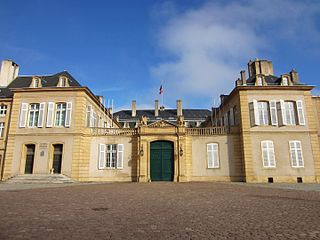
Moselle is the most populous department in Lorraine, in the east of France, and is named after the river Moselle, a tributary of the Rhine, which flows through the western part of the department. It had a population of 1,046,543 in 2019. Inhabitants of the department are known as Mosellans.
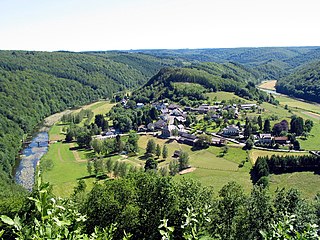
The Ardennes, also known as the Ardennes Forest or Forest of Ardennes, is a region of extensive forests, rough terrain, rolling hills and ridges primarily in Belgium and Luxembourg, extending into Germany and France. Geologically, the range is a western extension of the Eifel; both were raised during the Givetian age of the Devonian, as were several other named ranges of the same greater range.

The Moselle is a river that rises in the Vosges mountains and flows through north-eastern France and Luxembourg to western Germany. It is a left bank tributary of the Rhine, which it joins at Koblenz. A small part of Belgium is in its basin as it includes the Sauer and the Our.
The Eifelkreis Bitburg-Prüm is a district in Rhineland-Palatinate, Germany. It is bounded by Luxembourg, Belgium and the districts of Euskirchen, Vulkaneifel, Bernkastel-Wittlich and Trier-Saarburg.
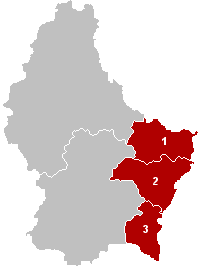
The District of Grevenmacher was one of three districts of Luxembourg. It contained three cantons divided into 25 communes:
- Echternach
- Grevenmacher
- Remich

Remich is a commune with town status in south-eastern Luxembourg with a population of 3,645 inhabitants as of 2018. It is the capital of the canton of Remich. Remich lies on the left bank of the river Moselle, which forms part of the border between Luxembourg and Germany. The commune is the smallest in Luxembourg by surface area.

Lorraine is a cultural and historical region in Northeastern France, now located in the administrative region of Grand Est. Its name stems from the medieval kingdom of Lotharingia, which in turn was named after either Emperor Lothair I or King Lothair II. Lorraine later was ruled as the Duchy of Lorraine before the Kingdom of France annexed it in 1766.

Grevenmacher is a commune with town status in eastern Luxembourg, near the border with Germany. It gives its name to and is the capital of the canton of Grevenmacher, and, until its abolition in 2015, the district of Grevenmacher. The town is situated on the left bank of the river Moselle, in a wine growing region.

Gutland is a region covering the southern and central parts of the Grand Duchy of Luxembourg. The Gutland covers 68% of the territory of Luxembourg; to the north of Gutland lies the Oesling, which covers the remaining 32% of the Grand Duchy. To the east, the Luxembourgian Gutland adjoins the Bitburger Gutland of Germany.

Ahn is a wine-growing village in the municipality of Wormeldange in the district and canton of Grevenmacher in the southwestern side of the Grand Duchy of Luxembourg. In 2005, the population is 208.

Wintrange is a small town in the commune of Schengen, in southeastern Luxembourg. As of 2008, the town has a population of 402. In 2006, the Commune de Remerschen was renamed Commune de Schengen.

Nittel, on the Upper Moselle, is an ortsgemeinde in the Landkreis [county] of Trier-Saarburg in the state of Rhineland-Palatinate. It belongs to the Verbandsgemeinde [United Municipalities] of Konz. The place, located between dolomite and limestone cliffs, is a nationally recognized resort.

Moselle wine is produced in three countries along the river Moselle: France, Luxembourg and Germany. Moselle wines are mainly white and are made in some of the coldest climates used for commercial winemaking.
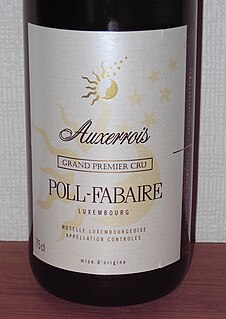
Luxembourg wine is primarily produced in the southeastern part of the Grand Duchy of Luxembourg, with vineyards overlooking the river Moselle. Along this river, which for 42 km makes up part of the border between Luxembourg and Germany, wine is made in three countries. There is a continuous history of winemaking along Moselle and in Luxembourg going back to Ancient Roman times. Wine production in 2006/07 was 123,652 hectoliter from 1,237 hectares of vineyards. Out of total wine exports of 87,776 hectoliter in 2005/06, 71,726 hectoliter or 82% was exported to nearby Belgium. Exports to Germany were the second largest at 8,168 hectoliter, or 9%, and is to a large extent made up of base wine in bulk for the production of blended Sekt rather than being sold bottled with "Luxembourg" anywhere on the label. Therefore, very little Luxembourg wine is seen outside Luxembourg and Belgium.

Tourism in Luxembourg is an important component of the national economy, representing about 8.3% of GDP in 2009 and employing some 25,000 people or 11.7% of the working population. Despite the 2008–2012 global recession, the Grand Duchy still welcomes over 900,000 visitors a year who spend an average of 2.5 nights in hotels, hostels or on camping sites. Business travel is flourishing representing 44% of overnight stays in the country and 60% in the capital, up 11% and 25% between 2009 and 2010. Published by the World Economic Forum in March 2011, the Travel and Tourism Competitiveness Report puts Luxembourg in 15th place worldwide, up from 23rd place in 2009.

The ING Route du Vin Half Marathon is an annual road running competition over the half marathon distance (21.1 km/13.1 mi) which takes place in late September in Remich, Luxembourg. It is organised by the Luxembourg Athletics Federation and it is a member race of the Association of International Marathons and Distance Races. It is sponsored by ING Luxembourg.
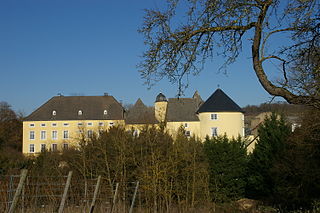
Schloss Thorn is a former castle, that has been turned into a stately home. It lies in the locality of Schloss Thorn, in the municipality of Palzem in the Landkreis Trier-Saarburg, Rhineland-Palatinate. The current owners are the Barons von Hobe-Gelting.
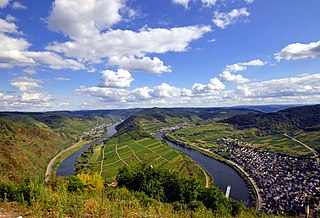
The Moselle Eifel forms the southeastern strip of the East Eifel to the left of the Moselle from the city of Trier downstream as far as Moselkern; in the southeast it does not reach as far as the Moselle Valley. It lies exclusively within the German state of Rhineland-Palatinate and is a truncated highland, roughly half of which is forested.




















